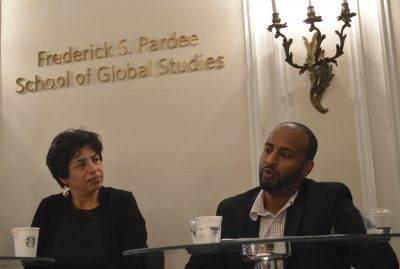
Four BU faculty members held a panel discussion, “Beyond the Headlines: U.S. Election: The World Reacts” at the Frederick S. Pardee School of Global Studies late Tuesday afternoon to discuss President-elect Donald Trump’s potential impact on the world.
Approximately 50 students and professors attended the discussion, which was part of the Beyond the Headlines series, a program designed to facilitate relaxed but in-depth discussions about current events and to engage faculty and students from a diverse array of backgrounds in a global discourse, Pardee Strategic Initiatives Manager Victoria Puyat said.
“This is meant to be an informal discussion of the things we are watching on TV [and] hearing on the radio, but discussed in a more in-depth, informal way,” Puyat said.
During the first half of the discussion, the panelists, each of whom is an expert of a region of the world, provided a brief overview of their region’s general reaction to the election Trump.
Director of Latin American Studies Adela Pineda moderated the panel of four and gave her insight as an immigrant from Mexico.
Pineda opened the discussion, emphasizing the shocking nature of Trump’s campaign and how the election was felt around the world.
Senior lecturer Kheireddine Bekkai, an expert of the Middle East, discussed the dark humor Algerians are currently expressing toward Americans. With all of their experiences conducting coup d’états, many Algerians are jokingly offering their assistance to US citizens, Bekkai said.
David Palmer, a Pardee professor, talked about the sentiments of shock, anger and disgust permeating Latin American communities. Palmer said people from the region feel utterly disrespected by Trump’s inflammatory rhetoric.
This election has led many Latin Americans to feel increasingly cynical toward the notion of democracy, an ideal that the United States prides itself in, Palmer said. Latin Americans see the election of Trump as a regression of American democracy and an action that contradicts American values of freedom.
Michael Woldemariam, another Pardee professor, discussed the response from Africa. He emphasized the disparity in excitement between African governments and the African public. He said African governments were rushing to congratulate Trump on his win, while the public was far more disappointed.
In fact, following the election, the Daily Nation, a Kenyan newspaper, published the headline, “America Does the Unthinkable,” and wrote “Let the Donald J. Trump Horror Show Begin.”
“We have absolutely no idea what a Trump administration will look like,” Woldemariam said after the discussion.
The discussion was followed by a question-and-answer portion with the audience, where questions ranged from speculating who Trump will appoint as his foreign diplomats to whether Trump’s election will have an impact on if international students will want to study in the United States.
Several attendees said after the event that they appreciated hearing the world’s response to the presidential election.
Rachel Schlueter, a junior in the College of Arts and Sciences, said she has been talking about this election a lot in Woldemariam’s class.
“I was interested to see if that uncertainty was felt throughout the rest of the world outside of Africa, which seems pretty consistent [when I] heard about Latin America and Europe with the rise of nationalism,” Schlueter said.
Louise Carbery, a senior in CAS, said the discussion expanded on the technical information she is learning in class.
“As a [political science] major, I get the nuts-and-bolts policy and theories about the 2016 election, [but] my courses don’t necessarily cover the international reaction,” Carbery said.
Diane Palmer, the wife of panelist David Palmer, said this discussion drew attention to otherwise neglected issues.
“Nobody has any answers right now,” said Palmer, who used to teach at BU. “We have no idea, but it’s fun to be able to talk about what might happen, or how Africans might see it, or how Northern Africans might see it.”






















































































































